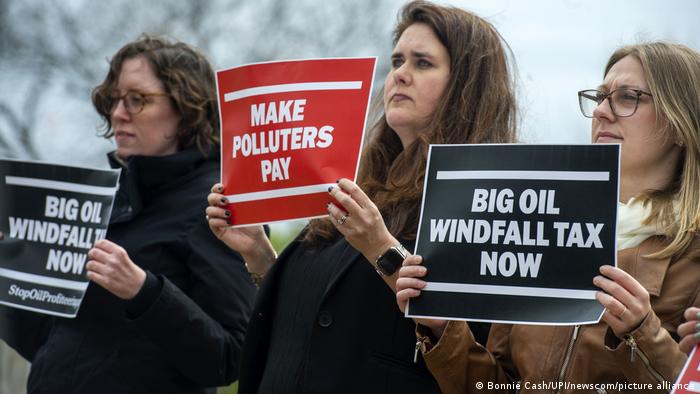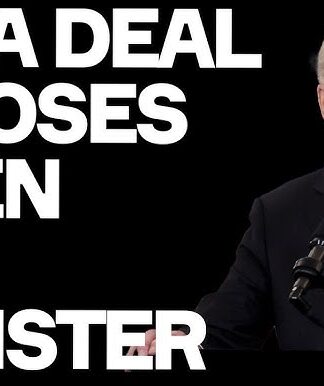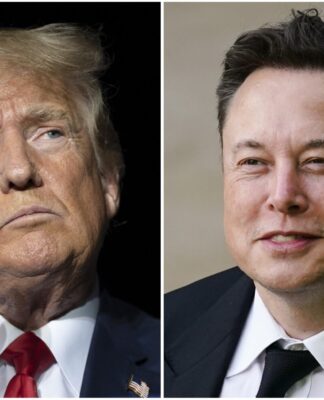Why single out energy companies for windfall tax?
Energy companies are having to pay a one-off tax on their war-fueled profits in many countries. But what about tech firms like Apple and Amazon that benefited massively from pandemic-induced lockdowns not so long ago?
 There is a growing clamor to levy windfall taxes on energy firms that are benefiting from higher oil and gas prices
There is a growing clamor to levy windfall taxes on energy firms that are benefiting from higher oil and gas prices
In May, the United Kingdom announced a windfall tax on energy companies that have been pocketing extraordinary profits as Russia’s invasion of Ukraine drives up oil and gas prices.
The decision followed similar moves by countries like Italy and Romania on power generators to ensure the industry shared the moolah it’s been raking in as a result of the war. Others like the United States and the European Union are also contemplating a tax on the “war-fueled profits” of major energy firms.
Major oil and gas firms such as BP, Exxon and Shell have found themselves in the dock for reporting massive earnings amid the war that has caused food and energy prices to spiral,compounding consumer misery globally. There is a growing clamor that energy companies part with some of those profits to support efforts by governments, most of them saddled with pandemic-era debt, to help ease the burden on poor consumers.
“This is a very obvious moment for a windfall tax because you have an industry which is making what are clearly supernormal profits at a time when the ordinary people who are the consumers of that industry are facing very high costs,” said Alex Cobham, chief executive of the Tax Justice Network. “So, doing a one-off redistribution of some of that excess profit in order to reduce the human costs of the price changes makes absolute sense.”
What is windfall tax?
A windfall tax is a one-off tax on companies that have seen their profits surge extraordinarily not because of any clever investment decision they’ve taken or an increase in efficiency or innovation, but simply because of favorable market conditions.
While an economically efficient way to tax companies that have fortuitously struck gold, windfall taxes are despised by the industry. The one-off taxes, which by definition are imposed retrospectively, are seen as arbitrary, fueling uncertainty among businesses about future taxes.
“I’m not a big fan of windfall taxes. It’s better to say in advance how much tax you are going to levy in different circumstances and then do it rather than creating sudden one-off surprises in the tax system,” Stuart Adam, senior economist at the Institute for Fiscal Studies in London, told DW.
Adam says windfall taxes are ‘arguably’ unfair to companies that have made investment decisions based on the existing tax system and are then retrospectively told to pay up more, creating an impression of ambiguity and randomness that can discourage investment.
“If you ask people in business or tax professionals what they look for in the tax system, usually at the top of that list is stability and certainty and predictability and windfall taxes move away from that,” he said.
“Having said that, I can see the case for doing it. When something like the Russian invasion of Ukraine happens, you can argue that this isn’t something we could legislate for in advance. So, it’s fair to tax companies retrospectively because they’ve benefited from a windfall that they did nothing to earn,” Adam said.
The German government struggling to wean itself off Russian energy while looking to ease the impact of high energy prices on consumers is also toying with the idea of windfall taxes on energy firms but so far remains split on the issue.
“Such concepts were already being discussed in the 1970s, but have never been implemented,” Finance Minister Christian Lindner, who is also the chairman of the pro-business Free Democrats, said in May. “It cannot be clearly identified what an excess profit is and what impact would be associated with it.”
Big Tech off the hook
The dash to grab a large pie of the profits of energy firms contrasts with the seeming largesse shown to major technology firms that made a windfall during COVID-19 lockdowns, in other words, they benefited from something they were not responsible for.
E-commerce behemoth Amazon saw its net profit soar more than 80% in 2020 when lockdowns shuttered its small, local brick-and-mortar rivals for months. The iPhone maker Apple benefited from the so-called stay-at-home stocks and posted record sales during the pandemic as people forced indoors used its devices and services to stay connected during the pandemic.
“They [Big Tech companies] have experienced unusual economic success during a period when the state has had to incur large extra costs to support the vulnerable,” said Rob Harrison from UK-based Ethical Consumer, which launched a campaign last year calling for a windfall tax on major technology companies.
Cobham from the Tax Justice Network says the failure of governments to tax technology firms’ pandemic riches could lead to a public policy headache in the years to come.
“Because we allowed them to capture those huge excess profits and didn’t tax them, we’ve contributed to much less competition in the market. It was pretty hard to challenge Amazon in 2019, in 2022, it’s basically impossible,” he told DW.
Big Tech vs. Big Oil
So, how did the technology firms get away without paying any windfall taxes?
Cobham puts it down to effective lobbying by large technology firms as well as different priorities during the pandemic and now. Back then, people were more worried about their safety, vaccines and lockdowns than how much profit tech firms were making, he said.
“The link is genuinely much clearer now. These energy companies are making enormous profits and I can’t pay my energy bill to keep my house warm. It’s just much more tangible than I am suffering a lockdown and Amazon is making a lot of money. So, the pressure on politicians to act now is just much greater.”
Adam from the Institute for Fiscal Studies said levying windfall taxes on technology firms wouldn’t have been as simple as it’s in the case of energy firms.
“With the oil and gas producers, it’s relatively straightforward to identify which companies you’re talking about, profits from which activities and associate that with a specific event in the world that’s given rise to these windfall profits,” he said. “During the pandemic, it’s much harder to pin down exactly which profits of which companies you would want to tax for what period and why.”
However, Adam stressed it would have been unfair to target only tech firms for their profits during the pandemic as there were plenty of other companies, including vaccine makers like Pfizer and BioNTech and medical equipment producers, that made loads of money.
“I might have just increased the general corporate tax rate on profits made during that period on the basis that profits made during the pandemic were less likely to reflect investment, innovation, or customer service and more likely to reflect brute luck,” Adam said.
Edited by: Hardy Graupner


























